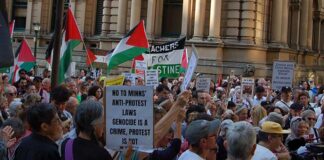If you’re feeling worse off financially, it’s because you are. Wages in Australia went backwards in real (after inflation) terms in the first quarter of 2017.
It’s part of a long-term decline. According to the Australia Institute, wages and super contributions fell to just 46.2 per cent of national GDP in the first quarter of 2017, below the previous record low in 1959.
We deserve a pay rise—and the Governor of the Reserve Bank of Australia, Philip Lowe, agrees.
His speech in late June urging workers to ask for higher wages raised eyebrows. As the ABC put it: “It wasn’t quite Karl Marx, but, for a central bank boss, it was heady stuff…”
Marx called capitalists “a band of warring brothers”. Individual employers are happy to keep their own wage bill low—but they would prefer other bosses to pay more, to boost workers’ consumption.
Lowe’s role means he speaks for Australian capitalism’s overall interests. And he’s concerned that rising electricity and gas bills will mean workers having less to spend on discretionary items.
It’s a process that’s already under way, according to the head of Coles, John Durkan. Speaking in late July, he said families were spending less on fresh food and meat in favour of cheaper groceries.
Households in the bottom fifth of income distribution had experienced average cost of living increases of 8 per cent since 2011, compared with 6.2 per cent for those in the top fifth.
Treasurer Scott Morrison shares Lowe’s concerns about low wage growth—not least because it means less revenue from income tax. But the federal government has been leading the way in offering miserly increases to public servants.
There are two reasons why he and other employers are getting away with this for the moment.
One is the continuing decline in union membership. Where unionism remains strong, as in commercial construction, wage rises are around the 4 per cent mark. But too few workers are in strong unions or any union at all.
The results can be no pay rise—staff at the Bureau of Meteorology, for example, haven’t had a pay rise in four years—or pay cuts, in the shape of reduced penalty rates.
Traditionally, economic growth and falling unemployment help workers gain higher wages. But economists are reporting that the recent rise in full-time jobs isn’t the whole picture.
The proportion of underemployed people—those who have a job but want or need more hours—rose to 8.8 per cent in the second quarter this year, the worst since 1978.
So it appears that some workers are prepared to go with minimal or no pay rises in the belief they may be able to get more hours overall.
Debt
The other issue worrying Philip Lowe is rising household debt, which as a share of total after-tax income rose to 190 per cent in March, among the highest proportions in the world.
The National Debt Helpline took more than 150,000 calls last year and on current volumes they’re expecting that figure to rise to 182,000 this year.
When interest rates rise from their current historic low, that will tip many workers into mortgage stress, and many already in stress into crisis.
Again, it’s already happening. In March, 22 per cent of the 3.1 million households with mortgages in Australia were suffering mild stress—cutting spending or running up credit card bills to make their home payments.
About 1 per cent of households are in severe stress—behind with their repayments.
So it’s no surprise that when Morrison said it was nonsense to say that inequality was rising in Australia, he was howled down by many—including the “Bolshevik banker”, Philip Lowe.
Lowe, like many members of the ruling class, are not just worried about workers’ spending power—they’re also concerned that the squeeze on workers will lead to a rise in political anger.
The Age reported a discussion among business leaders and academics at the Australian National University in June.
Peter Varghese, a former head of the Department of Foreign Affairs and now Chancellor at the University of Queensland, summed up their angst.
“Every now and then,” Varghese said, “I just wonder whether this was a gathering of the Ancien Regime and that we are all eating cake at Marie Antoinette’s party.
“One day we might wake up and find the peasants are revolting.”
The more far-sighted members of the ruling class can see the contours of a revolt against neo-liberalism similar to the ones in Greece, France or Britain beginning to take shape under the surface of society.
Their fear is our hope.
By David Glanz





